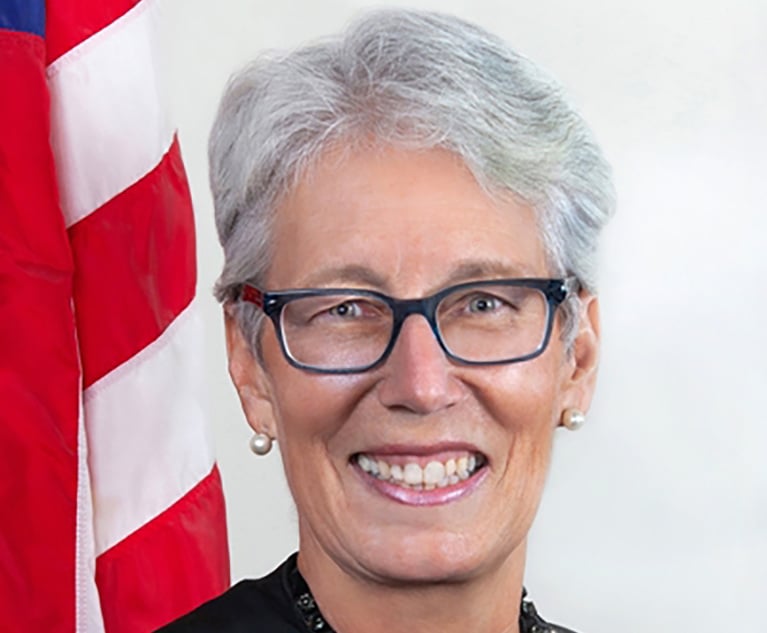Del. Lawmakers Preparing Legislation to Codify Jennings' New Policies
The new orders, outlined Monday in a seven-page memo by Attorney General Kathy Jennings, instruct prosecutors to limit the the number of charges brought in indictments, consider alternatives to jail in fashioning plea agreements and expand expungements for marijuana possession or arrests for other offenses that are no longer crimes.
February 19, 2019 at 06:28 PM
4 minute read
The original version of this story was published on Delaware Law Weekly
 Delaware Attorney General Kathy Jennings.
Delaware Attorney General Kathy Jennings.
Lawmakers in Dover said Tuesday that they were working to codify new internal policies at the Department of Justice, which aim to move Delaware toward a more “fair and equal” criminal justice system by prioritizing the prosecution of violent crimes over low-level, nonviolent offenses.
The new orders, outlined Monday in a seven-page memo by state Attorney General Kathy Jennings, instruct prosecutors to limit the the number of charges brought in indictments, consider alternatives to jail in fashioning plea agreements and expand expungements for marijuana possession or arrests for other offenses that are no longer crimes.
The goal of “presumptive guidelines,” Jennings said, was to provide rehabilitation and “second chances” to first-time offenders, while freeing up resources to combat “serious and violent crime.”
“We are continuing to work on other initiatives outside of our office, but our internal reforms are an important step forward in a long journey toward the model of justice that the people of this state expect of us, and that we expect of ourselves,” Jennings said in a statement.
But while the memo provides ”general direction and guidance” to prosecutors, it does not establish a legal right for a defendant to have the policies enforced in court. Nor does it guarantee that they would continue to be enforced under the administration of a different AG.
Lawmakers, meanwhile, were looking to make the changes permanent, as the General Assembly continues to enact a slate of criminal justice reforms this year, including a top-down rewrite of the state's criminal code.
“I think the next steps are to codify as much as can be codified,” state Sen. Bryan Townsend, D-Newark, said of the policies.
Townsend said that Jennings had been engaged in discussions with members of the General Assembly, who were drafting legislation and planned to start introducing bills as soon as next month.
“I think there's a tremendous amount of goodwill right now to figure out how and what to codify,” he said.
In the memo, Jennings said her DOJ would adopt an “office-wide presumption” not to charge multiple minimum mandatory crimes when just one would account for the facts of a specific offense. Plea agreements, she said, would take into account the need for drug and mental health treatments, and consider whether a defendant is a candidate for residential treatment, instead of prison.
For sentences up to 12 months, deputies would ask for probation or home confinement, and the state prosecutor would have to authorize prison sentences of more than 20 years in cases not involving murder, manslaughter, sex offenses and child abuse.
“These proposals will greatly increase fairness for those who come in contact with the justice system. It shows an understanding that there's no one-size-fits-all approach when it comes to justice, and that ensuring public safety doesn't mean we lock up every person who faces or is convicted of charges,” said Rep. Sean Lynn, D-Dover, who chairs the House Judiciary Committee.
State Sen. Colin Bonini, R-Dover South, said he supported measures for expanding expungements and pardons, but he criticized other policies that he said would inevitably lead to more crime, with offenders being released back into the community.
“This is continuing the trend [in Delaware] of not holding people accountable for criminal activity,” he said. “I think it's a mistake, and our constituents are going to pay for it.”
Despite his opposition, Bonini acknowledged that there were likely enough votes in the General Assembly to pass the forthcoming legislation.
“I just hope we have this debate,” he said. “My hope is we're going to have a very public discussion.”
Attorneys at the Office of the Public Defender have long opposed the ability of prosecutors to “stack” multiple mandatory minimum charges in cases involving the same underlying conduct, arguing that the practice pressures defendants into taking stiff plea deals, rather than challenge the charges in court.
On Tuesday, Chief Defender Brendan O'Neill said he hoped the new policies would lead to meaningful change within criminal justice system and better outcomes for defendants.
“This is a very positive development and a good step forward. The question is going to be, when the rubber hits the road, are they going to be implemented and followed by the deputies,” he said.
“The men and women of the Office of Defense Services look forward to working with the DOJ to implement these policies.”
This content has been archived. It is available through our partners, LexisNexis® and Bloomberg Law.
To view this content, please continue to their sites.
Not a Lexis Subscriber?
Subscribe Now
Not a Bloomberg Law Subscriber?
Subscribe Now
NOT FOR REPRINT
© 2025 ALM Global, LLC, All Rights Reserved. Request academic re-use from www.copyright.com. All other uses, submit a request to [email protected]. For more information visit Asset & Logo Licensing.
You Might Like
View All
Attorneys, Professors Share Support for Chancellor Following Musk's Online Attacks
4 minute read

Jurden Announces 2025 Retirement, Capping 24 Years on Superior Court
3 minute read
Trending Stories
- 1Public Notices/Calendars
- 2Wednesday Newspaper
- 3Decision of the Day: Qui Tam Relators Do Not Plausibly Claim Firm Avoided Tax Obligations Through Visa Applications, Circuit Finds
- 4Judicial Ethics Opinion 24-116
- 5Big Law Firms Sheppard Mullin, Morgan Lewis and Baker Botts Add Partners in Houston
Who Got The Work
J. Brugh Lower of Gibbons has entered an appearance for industrial equipment supplier Devco Corporation in a pending trademark infringement lawsuit. The suit, accusing the defendant of selling knock-off Graco products, was filed Dec. 18 in New Jersey District Court by Rivkin Radler on behalf of Graco Inc. and Graco Minnesota. The case, assigned to U.S. District Judge Zahid N. Quraishi, is 3:24-cv-11294, Graco Inc. et al v. Devco Corporation.
Who Got The Work
Rebecca Maller-Stein and Kent A. Yalowitz of Arnold & Porter Kaye Scholer have entered their appearances for Hanaco Venture Capital and its executives, Lior Prosor and David Frankel, in a pending securities lawsuit. The action, filed on Dec. 24 in New York Southern District Court by Zell, Aron & Co. on behalf of Goldeneye Advisors, accuses the defendants of negligently and fraudulently managing the plaintiff's $1 million investment. The case, assigned to U.S. District Judge Vernon S. Broderick, is 1:24-cv-09918, Goldeneye Advisors, LLC v. Hanaco Venture Capital, Ltd. et al.
Who Got The Work
Attorneys from A&O Shearman has stepped in as defense counsel for Toronto-Dominion Bank and other defendants in a pending securities class action. The suit, filed Dec. 11 in New York Southern District Court by Bleichmar Fonti & Auld, accuses the defendants of concealing the bank's 'pervasive' deficiencies in regards to its compliance with the Bank Secrecy Act and the quality of its anti-money laundering controls. The case, assigned to U.S. District Judge Arun Subramanian, is 1:24-cv-09445, Gonzalez v. The Toronto-Dominion Bank et al.
Who Got The Work
Crown Castle International, a Pennsylvania company providing shared communications infrastructure, has turned to Luke D. Wolf of Gordon Rees Scully Mansukhani to fend off a pending breach-of-contract lawsuit. The court action, filed Nov. 25 in Michigan Eastern District Court by Hooper Hathaway PC on behalf of The Town Residences LLC, accuses Crown Castle of failing to transfer approximately $30,000 in utility payments from T-Mobile in breach of a roof-top lease and assignment agreement. The case, assigned to U.S. District Judge Susan K. Declercq, is 2:24-cv-13131, The Town Residences LLC v. T-Mobile US, Inc. et al.
Who Got The Work
Wilfred P. Coronato and Daniel M. Schwartz of McCarter & English have stepped in as defense counsel to Electrolux Home Products Inc. in a pending product liability lawsuit. The court action, filed Nov. 26 in New York Eastern District Court by Poulos Lopiccolo PC and Nagel Rice LLP on behalf of David Stern, alleges that the defendant's refrigerators’ drawers and shelving repeatedly break and fall apart within months after purchase. The case, assigned to U.S. District Judge Joan M. Azrack, is 2:24-cv-08204, Stern v. Electrolux Home Products, Inc.
Featured Firms
Law Offices of Gary Martin Hays & Associates, P.C.
(470) 294-1674
Law Offices of Mark E. Salomone
(857) 444-6468
Smith & Hassler
(713) 739-1250






